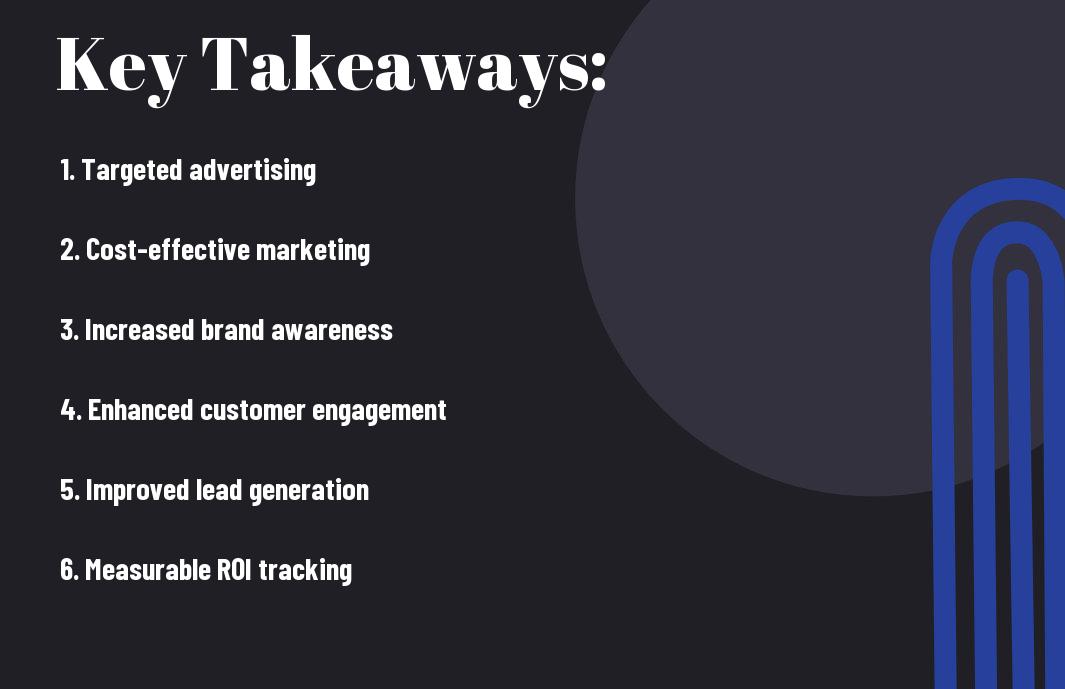Embrace the power of social media pay-per-click (PPC) advertising and watch your small business reach new heights of success. With targeted ads reaching the right audience, you can expect to see an increase in website traffic, customer engagement, and ultimately, sales. Unlike traditional advertising methods, social media PPC allows you to track and measure the success of your campaigns in real time, providing you with valuable insights to refine your strategy and maximize your return on investment. Furthermore, with the ability to set your own budget and customize your ad content, you have full control over how much you spend and who sees your ads. In this blog post, we’ll explore the numerous benefits of social media PPC for small businesses and how you can leverage this powerful tool to propel your business forward.
Key Takeaways:
- Increased Brand Visibility: Social media PPC allows small businesses to increase their brand visibility and reach a wider audience through targeted advertising.
- Cost-Effective Advertising: Small businesses can benefit from social media PPC as it offers cost-effective advertising solutions, allowing them to reach potential customers within their budget.
- Targeted Audience Reach: Social media PPC enables small businesses to target their audience based on demographics, interests, and behaviors, ensuring that the right people see their ads.
- Measurable Performance: Small businesses can track the performance of their social media PPC campaigns through detailed analytics, allowing them to make data-driven decisions for future marketing strategies.
- Increased Website Traffic and Conversions: Social media PPC can drive traffic to a small business’s website and lead to higher conversions, ultimately boosting their sales and revenue.
 Understanding Social Media PPC
Understanding Social Media PPC
Even if you are not familiar with the term, you have likely encountered pay-per-click (PPC) advertising while browsing the web. PPC is a digital marketing strategy where advertisers pay a fee each time their ad is clicked. This form of online advertising can be a valuable tool for small businesses looking to reach a targeted audience and increase website traffic. To learn more about the 10 key benefits of PPC for small businesses, check out this informative article here.
What is Pay-Per-Click Advertising?
Pay-per-click (PPC) advertising is a model of internet marketing in which advertisers pay a fee each time one of their ads is clicked. It is a way of buying visits to your site, rather than attempting to “earn” those visits organically. This model allows you to place bids for ad placement in a search engine’s sponsored links when someone searches on a keyword that is related to your business offering.
Major Social Media Platforms for PPC
Social media platforms such as Facebook, Instagram, Twitter, and LinkedIn are all powerful channels for PPC advertising. These platforms offer sophisticated targeting options and analytics, making it easier for you to reach your ideal audience. Whether you are looking to generate leads, increase brand awareness, or drive website traffic, social media PPC enables you to connect with potential customers in a highly targeted and cost-effective manner. Remember, the key is to leverage the strengths of each platform to achieve your specific business goals.
Strategic Advantages of Social Media PPC
After understanding the basic concept of Social Media Pay-Per-Click (PPC) advertising, it’s important to delve into the strategic advantages it offers for small businesses. Social Media PPC provides a range of benefits that can have a significant impact on your business’s online presence and overall marketing strategy. In this chapter, we will explore the various advantages of utilizing Social Media PPC for your small business.
Targeted Advertising
One of the most significant advantages of Social Media PPC is the ability to target your advertising towards specific demographics, interests, and behaviors. You can reach potential customers based on their age, location, gender, interests, and browsing behavior. This targeted approach allows you to segment and tailor your ads to reach the most relevant audience for your products or services. By doing so, you can increase the likelihood of engaging with potential customers who are most likely to convert, thereby maximizing the return on your advertising investment.
Cost-Effectiveness and Budget Control
Another key advantage of Social Media PPC for small businesses is its cost-effectiveness and budget control. With Social Media PPC, you have the flexibility to set your budget according to your financial constraints. You can also determine how much you are willing to pay for each click, ensuring that you are only spending money when potential customers click on your ads. This level of control allows you to optimize your budget and ensure that you are not overspending on advertising, making it a cost-effective option for small businesses.

Implementing Social Media PPC Campaigns
To successfully implement a social media PPC campaign for your small business, there are several key steps you need to take. These include setting goals and objectives, creating compelling ad content, and tracking metrics and analyzing performance.
Setting Goals and Objectives
When starting a social media PPC campaign, it’s crucial to define your goals and objectives. What do you want to achieve with your campaign? Are you looking to drive traffic to your website, increase brand awareness, or generate leads? By clearly outlining your goals and objectives, you can tailor your campaign to achieve the best results for your small business.
Creating Compelling Ad Content
Once you have established your goals, it’s time to create compelling ad content that will resonate with your target audience. Your ad copy, visuals, and call-to-action should be clear, attention-grabbing, and persuasive. Remember, you’re competing for attention in a cluttered social media environment, so your content needs to stand out and compel users to take action.
Tracking Metrics and Analyzing Performance
After launching your social media PPC campaign, it’s essential to track key metrics and analyze performance to determine the effectiveness of your ads. You should monitor metrics such as click-through rate, conversion rate, cost per acquisition, and return on ad spend to gain insights into how well your campaign is performing. By continuously analyzing performance data, you can make informed decisions to optimize your campaign for better results.
Case Studies and Success Stories
Not convinced that social media PPC can benefit your small business? Take a look at these case studies that showcase just how powerful it can be:
- One small business saw a 300% increase in website traffic within just 3 months of implementing a social media PPC campaign.
- Another company experienced a 40% increase in sales leads after running a targeted Facebook PPC campaign.
- A small retailer achieved a 200% return on investment from a 6-month Instagram PPC campaign, leading to a significant increase in online sales.
If you want to learn more about the benefits of PPC for small businesses, check out 3 Benefits of PPC For Small Businesses – Addison Clark for additional insights and success stories.
Small Businesses Thriving with Social Media PPC
Small businesses like yours are thriving with the use of social media PPC. By targeting specific audiences and leveraging the power of platforms like Facebook, Instagram, and Twitter, you can quickly and effectively reach potential customers. With the right strategy in place, you can see a significant increase in your online visibility, engagement, and ultimately, sales.
Lessons Learned and Best Practices
When it comes to social media PPC, it’s essential to carefully monitor and adjust your campaigns based on the performance data you receive. You’ll need to continually refine your targeting and messaging to ensure you’re reaching the right audience with the right message at the right time. Don’t forget to test different ad formats, creative elements, and calls-to-action to find what resonates best with your audience. It’s all about staying agile and being willing to learn and iterate based on what the data tells you.
The Benefits of Social Media PPC for Small Businesses
Considering all points, it’s clear that social media PPC can be an incredibly valuable tool for small businesses. Not only does it provide a cost-effective way to reach potential customers, but it also allows for precise targeting and detailed analytics to measure the success of your campaigns. By utilizing social media PPC, you can effectively increase brand awareness, drive website traffic, and ultimately, generate more leads and sales for your business. The ability to tailor your ads to specific demographics and interests means that you can ensure your message is being presented to the right audience at the right time. With all these benefits, it’s clear that social media PPC can be a game-changer for small businesses looking to expand their online presence and reach new customers.
FAQ: The Benefits of Social Media PPC for Small Businesses
Q: What is social media PPC?
A: Social media PPC (Pay-Per-Click) is a form of online advertising where businesses can display ads on social media platforms and only pay when users click on their ads. This method allows small businesses to target specific audiences and track the performance of their ad campaigns.
Q: How can social media PPC benefit small businesses?
A: Social media PPC can benefit small businesses by increasing their brand visibility, driving website traffic, generating leads, and ultimately boosting sales. It allows businesses to reach their target audience effectively and often at a lower cost compared to traditional advertising methods.
Q: Which social media platforms offer PPC advertising options for small businesses?
A: Major social media platforms such as Facebook, Instagram, Twitter, LinkedIn, and Pinterest offer PPC advertising options for small businesses. Each platform provides tools for targeting specific demographics, interests, and behaviors, allowing businesses to reach potential customers efficiently.
Q: How can small businesses measure the success of their social media PPC campaigns?
A: Small businesses can measure the success of their social media PPC campaigns through various metrics such as click-through rates, conversion rates, cost per click, and return on ad spend. These metrics provide valuable insights into the effectiveness of the campaigns and help businesses make data-driven decisions for future advertising efforts.
Q: What are some best practices for small businesses implementing social media PPC?
A: Some best practices for small businesses implementing social media PPC include defining clear campaign objectives, creating compelling ad creatives, targeting the right audience, continuously monitoring and optimizing campaigns, and testing different ad formats and messaging. It’s also essential to stay updated with platform algorithms and advertising policies to ensure compliance and maximize results.
